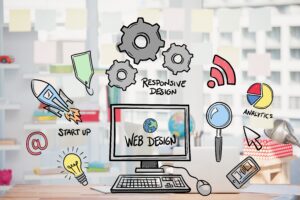The centuries-long pursuit to build up machinery and software with human-like aptitude is nearing realism. Scientists are creating intelligent machines that can reproduce the way of thinking, expand understanding, and permit computers to reach objectives, moving closer to imitating human thought development. These intelligent systems improve the accuracy of predictions, speed up problem-solving, and automate managerial tasks through Enterprise Web Cloud.
Much of the routine work is carried out by computers, while a lot of thinking depends on the precise human beings with specific skills and experience that are difficult to replace and scale. As the tech industry grows, including giants like Google, Facebook, and Amazon, they are investing billions in Artificial Intelligence research. Meanwhile, companies like those in the field of Custom Website Development Mississauga are focusing on leveraging human expertise to create innovative solutions that complement AI capabilities.
Artificial Intelligence is amplifying in several ways:
- Artificial Intelligence assists in breaking down big data to make predictive analytics. It then uses deep machine learning to improve that analytics.
- Voice assistants are becoming more prevalent.
- The Internet of Things is being reshaped by Artificial Intelligence.
- Mobile app development is undergoing a transformation, as AI can process data in more complex ways than ever before.
The potential impacts of AI are wide-ranging, from changing college admissions to influencing international relations and politics. For IT leaders, some key AI trends to watch include:
1. AI Powering Digital Transformation
AI will accelerate digital transformation initiatives, making existing business systems “smarter” through a process of “smartization”. This shift in competitiveness will impact those who effectively adopt AI into their business systems.
2. The AI Skills Gap
There is a shortage of developers, AI experts, and linguists needed to develop or train AI solutions, creating a new talent gap for organizations. Vendors are developing AI-powered tools that require less technical expertise to deploy.
3. Investing in Internal AI Skill Development
Forward-thinking IT leaders are investing in training their existing teams on advanced technologies like AI and machine learning, rather than relying on the limited talent pool in the market. This will give them an edge in talent retention and recruitment.
4. AI Changing, Not Replacing Jobs
While AI and automation will impact some jobs, experts predict a net increase in employment, with AI augmenting human workers rather than fully replacing them. The focus will be on human-machine collaboration.
In summary, the artificial intelligence landscape is rapidly evolving, with trends towards smarter digital transformation, addressing the AI skills gap, upskilling internal teams, and AI complementing rather than replacing human workers. Organizations that effectively harness these AI developments will gain a competitive edge.





